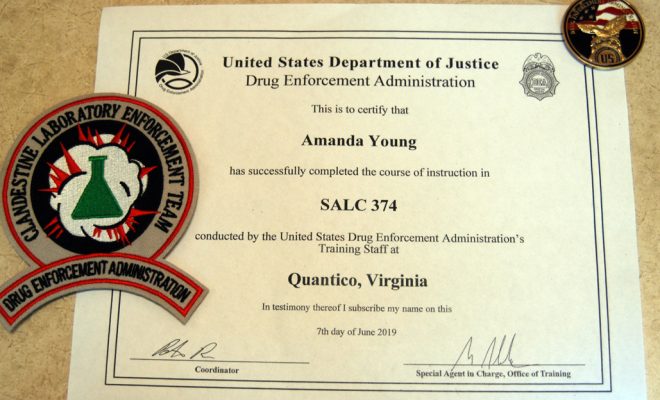Rhinelander officer valedictorian at national training course

By Lori Adler
Reporter
Patrol officer Amanda Young of the Rhinelander Police Department went to school this summer. She returned from her class not only a better officer, but as class validictorian.
Young attended nationwide training offered by the Drug Enforcement Agency (DEA) in Quantico, Va. The course was for state and local certification for clandestine labs and included 35 law officers from all across the country. Classwork featured demonstrations on how drug labs operate and manufacture various drugs and how to recognize the different types of labs. The main focus, however, was learning about all the hazardous chemicals used in the process, what these chemicals can do to the human body and how each chemical reacts with other chemicals. The purpose of the course is to train officers to lead a team into a lab, make it safe for investigators and other officers, and facilitate the removal of the hazards and clean-up of the lab.
“The week started out with all of us learning all about different materials that go into the drug-making process and what hazards those can pose,” Young said. “We learned how to utilize materials to tell us how many parts per million of an element in the air would be hazardous, and we learned to look at a book to show us at what level we can safely go in and take that lab apart.”
The course days were long and exhausting, according to Young, because the material is extremely intensive. At the end of the week, a written exam was given. In addition, the course required exercises called practicals. During these exercises, officers would gear up into special fire-proof hazmat-style suits with heavy boots, gloves and respirators. In full gear, they enter mock labs and work through a process of identifying what type of lab it is and recognizing all the hazards present. This was done during some very hot and humid Virginia weather, making these exercises even more difficult. During the practice sessions, officers were accompanied by trainers who helped them through the identification process, but during the final practical, officers did the exercise on their own.
“We have to go into these rooms and guess what type of lab it is, just from what all the materials are and what’s going on in that environment,” Young said. “I just used what they gave me. They taught us how to use this guide and you look for all the materials and it tells you what possible lab it could be, what drug they are trying to make, so you go to that page and here’s a list of chemicals.”
She then looked around the room and identified the various chemicals and determined what she thought the lab was. The trainer was impressed.
“The guy said he would hug me if it wasn’t inappropriate, saying that nobody has ever gotten it correct in the history of this class,” Young added.
The trainer went on to name Young as the class valedictorian and presented her with a Challenge Coin in addition to her certificate of completion.
Young received a DEA grant to participate in the training. The grant not only paid for the training but all her expenses including airfare, lodging and meals. In addition, she was able to keep all her textbooks as well as her complete hazmat suit and equipment.
“Drugs are such a problem; they want a lot of people certified,” Young said.
The DEA has been conducting this course since the 1990s, and while the Oneida County Sheriff’s Department has at least one person certified in clandestine labs, Young is the first to be certified at Rhinelander Police Department.
Leave a reply
You must be logged in to post a comment.




